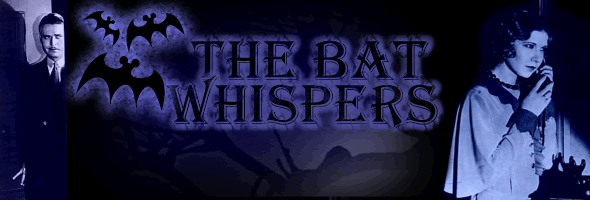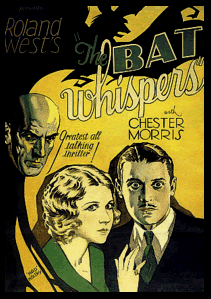
B&W, 1930, 82 mins. Directed by Roland West
Starring Chester Morris, Chance Ward, Grace Hampton, Una Merkel, Richard Tucker, Maude Eburne, Wilson Benge / Produced by Joseph M. Schenck / Cinematography by Ray June
Format: DVD - Image (MSRP $29.99)
Full Frame / Letterboxed (2.00:1) / Dolby Digital Mono
An archcriminal known as "The Bat" taunts police officers by providing clues about his upcoming crimes and carrying them out undiscovered anyway. After swiping a valuable necklace and knocking over a bank for good measure, The Bat sets out for a country home where a number of occupants are spending a creepy, rainy evening. All the usual suspects are here: the no-nonsense socialite Cornelia van Gorder (Grayce Hampton), the innocent romantic couple, the dubious doctor, and so on. Is one of these seemingly innocent people really The Bat?
Though formulaic in the extreme, The Bat Whispers distinguishes itself entirely through a succession of astonishing, gorgeous visual sequences which render the dialogue almost irrelevant. The camera swoops, glides, and dollies around more than the collective works of Orson Welles and Dario Argento combined, and the filmmakers use miniatures to create some astonishing effects in which the viewer is suddenly transported down hallways, out windows, and into small corners with breathtaking ease.
A better than average entry in the old "dark stormy night with a mysterious animalistic killer" genre, The Bat Whispers marked director Roland West's second take on the popular play, a contemporary of other similar films and stage works like The Cat and the Canary. Well, as it turns out, West had to actually make The Bat Whispers twice more, at the same time - once in standard full frame, and once in 65mm. Using different takes and framing throughout, the two may be identical in terms of casting and dialgoue but often play like completely different films.
 The full frame version has become more familiar to horror and mystery buffs, and on the whole, it seems to be a more polished cut. In the 65mm version (letterboxed at an approximation of the later Panavision aspect ratio), the camera remains more distant and sedentary, with entire scenes of dialogue running by with nary an edit. However, this also pumps up the atmosphere even more, with the set dressing and moody lighting taking complete precedence over the actors. Unfortunately, the 65mm process apparently proved too expensive for many retakes, as the actors often flub their lines and seem less confident than in the standard version. The comedy in the 65mm version suffers in particular, with several punchlines and bits of quirky character acting lost in the process. As with other horror films shot twice (a practice continued at least all the way until 1979's Nosferatu the Vampyre), the results are quite fascinating, and Image has done a major service by providing both variants on a single dual-layered disc for side to side comparisons. The 35mm version looks quite well preserved apart from the expected nick and scratch caused by the ravages of time; the contrast is especially impressive and appropriately dark. The 65mm version, preserved by the UCLA archives, looks noticeably more battered in spots, but it's a miracle it's managed to survive at all considering the rate of deteriorating film classics these days. Aside from the visual gimmickry and historical significance, The Bat Whispers contains a number of other points of interest which allow it to play like a rough draft for a William Castle film. In particular, one character emerges from a curtain after the finale to deliver a tongue-in-cheek admonishment to any audience members who might reveal The Bat's identity. Incidentally, this film was remade again far more traditionally in 1959 as The Bat, with Vincent Price and Agnes Moorehead (available on DVD as a double feature with House on Haunted Hill).
The full frame version has become more familiar to horror and mystery buffs, and on the whole, it seems to be a more polished cut. In the 65mm version (letterboxed at an approximation of the later Panavision aspect ratio), the camera remains more distant and sedentary, with entire scenes of dialogue running by with nary an edit. However, this also pumps up the atmosphere even more, with the set dressing and moody lighting taking complete precedence over the actors. Unfortunately, the 65mm process apparently proved too expensive for many retakes, as the actors often flub their lines and seem less confident than in the standard version. The comedy in the 65mm version suffers in particular, with several punchlines and bits of quirky character acting lost in the process. As with other horror films shot twice (a practice continued at least all the way until 1979's Nosferatu the Vampyre), the results are quite fascinating, and Image has done a major service by providing both variants on a single dual-layered disc for side to side comparisons. The 35mm version looks quite well preserved apart from the expected nick and scratch caused by the ravages of time; the contrast is especially impressive and appropriately dark. The 65mm version, preserved by the UCLA archives, looks noticeably more battered in spots, but it's a miracle it's managed to survive at all considering the rate of deteriorating film classics these days. Aside from the visual gimmickry and historical significance, The Bat Whispers contains a number of other points of interest which allow it to play like a rough draft for a William Castle film. In particular, one character emerges from a curtain after the finale to deliver a tongue-in-cheek admonishment to any audience members who might reveal The Bat's identity. Incidentally, this film was remade again far more traditionally in 1959 as The Bat, with Vincent Price and Agnes Moorehead (available on DVD as a double feature with House on Haunted Hill).
